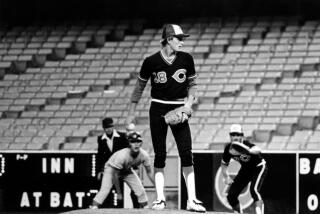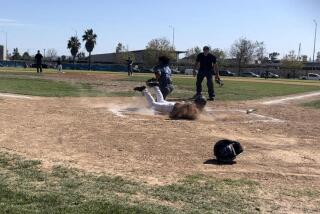He Didn’t Parrott His Older Brother : Steve Had Pitching Skills but Courted Basketball Too
- Share via
The athletic career of Steve Parrott, carrot-topped younger brother of former major league pitcher Mike Parrott, was at once remarkable and unexceptional, a grab bag of incongruities and ironies.
* He was an All-Southern Section basketball player only one year after playing his first organized game.
* He was a second-round draft choice of the Minnesota Twins after posting a 1-4 pitching record as a high school senior in 1975.
* He twice was offered a basketball scholarship to Pepperdine, but never attended the school.
* He quit professional baseball to play basketball at Moorpark College and eventually earned a scholarship to UC Santa Barbara, where he was the team’s most valuable player.
* He signed a second professional baseball contract after exhausting his college basketball eligibility and bounced around the minors and Mexico for five years.
Now a real estate appraiser, Parrott, 35, is refreshingly candid in appraising his own career.
“As far as baseball goes, I never felt shortchanged in any way. It’s not like I didn’t get a break or an opportunity,” he said. “My only regret is that physically I had the ability to be a major leaguer, but mentally I obviously didn’t have what it took.”
In a nutshell, that was the difference between Mike and Steve. Both Parrotts were tall, strapping right-handers, among the finest athletes in Ventura County during the early 1970s. Competitiveness ran deeper in Mike than in his kid brother, however.
“Steve was better than Mike at hoops, he liked the team aspect and didn’t like attention drawn to him,” said Remy McCarthy, a basketball teammate and lifelong friend of the Parrots. “Mike enjoyed taking a one-on-one challenge and destroying people. That’s why he made it to the big leagues.”
Steve, 6-foot-6 and 225 pounds in high school, refused to play organized basketball until he was in the 10th grade because his pale legs were a source of embarrassment to him.
Soon, however, it was opponents who blanched at the sight of Parrott, who started as a sophomore and was Marmonte League player of the year and All-Southern Section each of the next two seasons while leading Camarillo to two-year record of 51-10.
In the spring, his overpowering fastball and hard slider tempted comparisons to his brother, who by Steve’s junior year was climbing the ladder to the major leagues. Even though Parrott developed mononucleosis during his senior year, he was drafted in the second round by the Twins and assigned to Elizabethton (Tenn.) of the rookie Appalachian League.
Parrott, who wouldn’t turn 18 until September, was homesick and hated every minute. “I was miserable,” he said. “Looking back, that was a long 2 1/2 months.”
The next year was a case of same place, same thing. After the season, he enrolled at Moorpark and played basketball in 1976-77. “I don’t remember whether I told the Twins I was playing basketball,” he said.
No matter. He wasn’t long for the Twins anyway, quitting during spring training of 1977. He focused on basketball the next year, chose UC Santa Barbara over Pepperdine--which also had offered him a scholarship out of high school--and became the team’s best player.
Major league scout Ray Poitevint, who signed Mike Parrott, offered Steve a chance to resume his baseball career. Steve signed with the Milwaukee Brewers in 1980 and spent four seasons playing primarily for Stockton of the Class-A California League and El Paso of the double-A Texas League.
“Steve is one of the really nice guys and he obviously had drive and determination to succeed in basketball, but that’s what he lacked in baseball,” Poitevint said.
In 1984, the Brewers assigned Parrott to Satillo of the Mexican League. After two months, he came home for good. And home always was Camarillo, where the familiar comforts of family and friends are all Parrott requires.
“I can’t see myself moving out of Ventura County,” said Parrott, who a couple years ago purchased the house he grew up in from his parents. “I would have a very difficult time leaving here. I don’t know if I could or would.”
He has frequent conversations with his brother, but it is clear he never yearned to be like Mike.
“Now we talk about our careers, all those things,” Steve said. “Back then, I really can’t say I looked to him for any advice. Maybe I should have.”
More to Read
Get our high school sports newsletter
Prep Rally is devoted to the SoCal high school sports experience, bringing you scores, stories and a behind-the-scenes look at what makes prep sports so popular.
You may occasionally receive promotional content from the Los Angeles Times.







